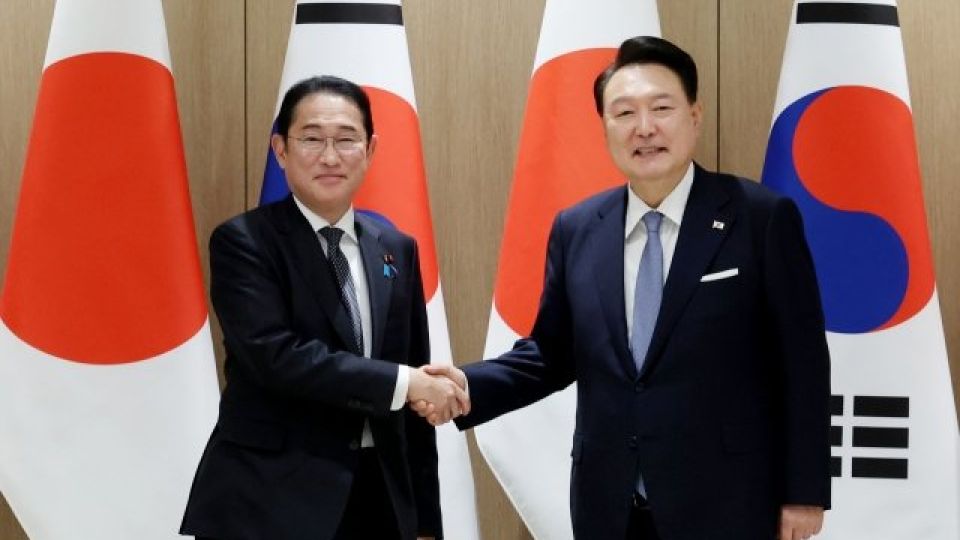September 9, 2024
SEOUL – The main opposition party slammed President Yoon Suk Yeol of “flattering” his Japanese counterpart, Prime Minister Fumio Kishida, accusing him of making consecutive concessions to Tokyo without securing a formal apology or compensation for its historical grievances.
A day after the Japanese prime minister left Seoul, the main opposition Democratic Party of Korea on Sunday pledged to revise rules to stop comfort women statues at home and abroad from being defaced or meddled with, without disclosing details. It also promised to elicit Japan’s formal apology and compensation for its past wrongdoings.
“The Japanese government has been constantly pouring in diplomatic efforts to take down the comfort woman statues in Germany and Italy, but the Yoon administration is merely repeating the disastrous pro-Japan flunkeyism, much less a strong reaction to them,” the women’s club of the party said in a statement.
This came as one of the 240 comfort women victims registered with the South Korean government passed away Saturday, leaving the number of survivors at just eight.
Yoon and Kishida held a farewell summit Friday in Seoul before the Japanese leader leaves office in three weeks. Kishida said in August he would not run in the leadership election for Japan’s ruling Liberal Democratic Party in late September.
Kishida on Friday repeated his remarks from his previous visit to Seoul in March 2023 that he had inherited “all of his predecessors’ recognition of history,” including a declaration between former Korean President Kim Dae-jung and former Japanese Prime Minister Keizo Obuchi in 1998 — under which Japan recognized its past suffering inflicted on the South Korean people when Japan colonized the Korean Peninsula.
Kishida also reiterated his 2023 remarks, saying it was “heartbreaking that many South Koreans went through difficult and sad experiences in the past,” in an apparent reference to Japan’s abuse of Korean forced labor, though delivered in an informal and personal tone.
Rep. Han Min-soo, spokesperson for the Democratic Party, on Saturday criticized Yoon for pursuing a “humiliating and subservient diplomacy” with Japan.
“Kishida stopped short of a sincere apology over the historical issues as he visited South Korea just before his departure (from his post),” Han told reporters at the National Assembly.
He also brought up former Foreign Minister Park Jin’s past remarks that he expected Japan to “fill a half-full glass of water,” saying Japan is rather “spilling the water.” Park’s comments date back to Seoul’s decision in March 2023 to lift Japanese entities’ mandate to back a fund to compensate forced labor victims in times of Japan’s 1910-1945 colonial rule.
Regarding Tokyo’s partial provision of the undisclosed list of Koreans aboard the Ukishima Maru vessel who died while being repatriated following the ship’s explosion in 1945 — immediately after Japan’s surrender in World War II — Han said Seoul’s surprise announcement just a day before the Yoon-Kishida summit was an attempt to sugarcoat Japan’s lack of recognition of historical issues.
Han, instead, pointed to the government’s failure to receive the listing of Korean forced labor at the Sado Island Gold Mines. The mine, laden with historical disputes with South Korea over its link to forced labor, was enshrined as a UNESCO World Heritage Site without Seoul’s objection. This came apparently in exchange for Japan’s commitments to operating exhibitions about the reality of Korean forced labor at the Sado mines and to holding annual memorial ceremonies honoring the Korean workers.
This contrasted with the ruling conservative People Power Party’s stance that the Yoon-Kishida talks bore fruit. People Power Party spokesperson Song Young-hoon said Saturday in a statement the summit yielded “practical achievements” such as the signing of a document that enshrines bilateral cooperation regarding evacuation plans during emergencies in third countries, as well as a review of a simplified immigration process for South Korean travelers to Japan and vice versa.
Han described the announcements Friday as “superficial.”
An official of the presidential office said on condition of anonymity Friday that Japan’s handover of the material related to Korean casualties from the Ukishima Maru vessel explosion came in Japan’s “stronger commitment to doing so amid improved Korea-Japan relationship.”
The source also said that Yoon and Kishida had no discussion over the UNESCO listing of Sado Island Gold Mines, as Seoul and Tokyo had already reached a compromise over the matter in July.
The relationship between Seoul and Tokyo began to thaw in early 2023. Yoon and Kishida had met 12 times as of Friday. In the meantime, Japan was excluded from its mandate to fund South Korean forced labor victims’ compensation and started releasing treated radioactive water from its crippled nuclear power plant off its east coast, while the Sado Island Gold Mines were added to the UNESCO World Heritage site.


